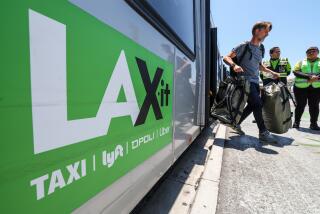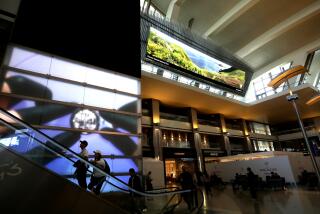Airport USO Offers Troops a Bit of Home
- Share via
When she was 17, Maxine Meyers was a junior hostess for the USO, dancing with GIs to Glenn Miller tunes at the club’s ballroom in Santa Monica.
Today, the USO sits in a modular building squeezed in front of the futuristic Encounter restaurant at Los Angeles International Airport.
There is no ballroom and no dancing. But Meyers, now 76, is there, bustling around the parking lot and ordering arriving troops to stack their duffels, stick on a name tag, head inside and grab a sandwich.
With a barrage of “yes, ma’ams,” “no, ma’ams” and “right away, ma’ams,” they do what she says, filing in as many of their fathers and grandfathers did at USOs in decades past.
During World War II, stars flocked to the USO’s Hollywood Canteen, serving coffee and doughnuts as pinup girls engaged the boys in spontaneous rumbas.
Today, the USO -- short for United Service Organizations -- is a humbler operation but still serves as a way station for troops who need a cup of coffee, a hot dog, a free phone card, an encouraging word, a haven in a big, sprawling city.
Officially known as the Bob Hope Hollywood USO at LAX, the modern day haven is about the size of a big one-bedroom apartment. Yet with the military buildup in the Middle East, it plays host to about 600 troops weekly, more than triple the number of just a few months ago.
Most arrive from area bases by charter bus and learn of the place by word of mouth. Some need their urban survival skills to find the out-of-the-way spot, which is unknown even to some airport employees.
Meyers has volunteered there 40 hours a week for most of the last nine years. The more than 1,000 military patches framed and mounted on the wall are emblems she cajoled from troops passing through.
She treats some of her charges with maternal briskness. “Put a sweater on!” she commanded a burly young Marine on a chilly evening. Others she helps gently through long, lonely nights of the soul.
“A few have never been on airplanes before,” she said. “They’ve hardly been away from home. One young man sat quietly for hours, just staring into space. All of a sudden he came up to me and said, ‘I’m scared!’ ”
“I didn’t want to tell him he shouldn’t feel that way,” Meyers said. “I just consoled him. I told him, ‘You didn’t know anyone before basic [training] and you found some friends there, right? Well, you’ll do that again. You’ll get through just fine!’ ”
Founded in 1941 to boost morale during World War II, the USO was first chaired by Prescott Bush, President George W. Bush’s grandfather. The group entertained millions of GIs over the years, producing extravaganzas not far from the front.
While the USO still mounts shows overseas (Ozzy Osbourne and the Dallas Cowboy cheerleaders were among last year’s attractions), it no longer runs clubs like the Hollywood Canteen, which were wildly popular.
“It got so crowded that if a soldier wanted to tune the radio he’d have to squeeze past Lana Turner, Hedy Lamarr, Dorothy Lamour and Betty Grable to change a station,” goes an old joke from Bob Hope, long the USO’s most ardent celebrity booster. “In five minutes I must have heard 148 different programs.”
At LAX, the USO isn’t much more than a bookcase -- paperbacks are free for the asking -- a big kitchen counter and a couple of couches. Portraits of Hope and his wife, Dolores, hang on the wall near a TV, unrecognized by many recruits who are barely out of high school.
“They’re so young,” Meyers said, wistfully, one recent afternoon, gazing at a Marine absorbed in a computer game.
DeShaun Carter, a 21-year-old Marine from Philadelphia, Miss., gave Meyers the high sign as he traded e-mails with his pals back home on one of the facility’s two computers. The day before, he had strolled along the Pacific, thanks to USO volunteers who directed him to a bus for Manhattan Beach. Now he was passing time, still waiting for a flight to his base in Hawaii.
“I’m nervous,” he said. “My wife and mother are pretty sketchy about all this, but they tell me to be safe and do my job, and everything will be fine.”
It was a typical day at the USO. A gangly Marine whose flight had come in late asked about cab fare to Camp Pendleton. Told it would be about $200, he swallowed hard and trudged toward the taxi stand.
“We told him he could wait for a bus and we would call his commanding officer, but he really wanted to get there on time,” Meyers said.
Sometimes Meyers wanders through the airline terminals, on the lookout for solitary young men and women in uniform staring into their empty coffee cups. Scammers have been known to target them as easy marks, she said. Some volunteer to haul their bags and then charge $20 or more for the service; others collect for bogus charities, including “wives and children of unknown soldiers.”
“At least they can be safe here,” Meyers said of the USO.
In midafternoon, 60 duffel-toting Marines fresh from Pendleton solemnly stepped down from two charter buses. On his way to field artillery school at Ft. Sill, Okla., Justin Gibson, 19, was overwhelmed by the thought of spending the next 10 hours in Los Angeles.
“It’s confusing,” said Gibson, who had never traveled far from his family’s farm outside Shenandoah, Iowa. “I guess I’ll just hang around with other Marines. I don’t want to wander off and get lost, and then be all by myself.”
Streaming into the USO, the young men quickly changed from pressed khakis into jeans and T-shirts. Just as quickly, their expressions changed from lock-step grim to teenage goofy.
With time to kill before flights to various posts scattered them around the U.S., many clamored for something to do in Los Angeles.
“Sir! Do you know the location of the nearest Hooters, sir?” asked an enthusiastic recruit.
Volunteer Vic Trippetti had heard the question many times before and instantly provided the answer.
“We’ll give you directions to malls, sports bars, whatever,” Trippetti added. “No strip clubs and no tattoo parlors, though.”
The USO staff of 37 volunteers is a far cry from the four who barely kept the place open before Mike Teilmann, a TV producer and retired brigadier general, became director last year.
With Teilmann leading the charge, the USO will take over an adjacent structure this spring, tripling its size and increasing its need for volunteers. The expanded facility will have displays devoted to famous USO troupers like Hope, Martha Raye, Johnny Grant and Mickey Rooney. But it also will offer cots, showers, a cappuccino bar, a library, a quiet space for reflection and a play area for military families traveling with children.
“I feel it’s so important to take care of these young people who are doing what I’m no longer able to do,” Teilmann said. “They’re at the tip of the spear.”
More to Read
Sign up for The Wild
We’ll help you find the best places to hike, bike and run, as well as the perfect silent spots for meditation and yoga.
You may occasionally receive promotional content from the Los Angeles Times.







